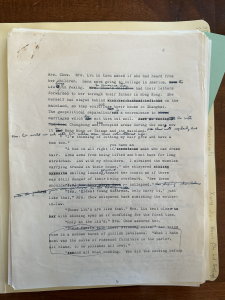This summer, I had the opportunity to conduct research for my senior thesis that I’m writing for the Department of History on the topic of Zhang Ailing, a transnational Chinese writer with support from Columbia’s Weatherhead East Asian Institute.
As Zhang’s archives are housed within the University of Southern California’s Special Collections, I traveled to Los Angeles in late August and made special preparations in order to view the documents. I hope to share some tips to guide future students who may be travelling to other libraries outside of New York in order to pursue their research topic!

The second page of “She Said Smiling,” a short story manuscript by Zhang Ailing,
Photo Credit: Donna Qi
1. Check library hours: Libraries operate on fairly regular schedules during the school year, but due to the fact that most of you may be receiving funding for research conducted during breaks (particularly during the summer), it is very important to check whether or not the library you need to go to is open when you are free to visit. It is also important to check what their hours are as you may have to adjust your trip accordingly so you get enough time in the archives. The USC Special Collections and the Rare Book Library was limited to opening from 1-5PM this summer, so I extended my trip so I had enough time to review and digitize materials for my senior thesis.
2. Follow the proper guidelines to reserving your materials: More likely than not, the materials that you are looking for are special and will not be available publicly, possibly due to the fragility of their condition. The Zhang Ailing Papers included several original letters and manuscripts that she had been working on up until her death, and so had to be specially requested. Most libraries will have a form that you can submit to request special materials and librarians will generally get back to you pretty quickly with your request.
It is important to correspond with the librarians directly to ensure that materials are available on view when you are visiting. I reserved my materials three weeks prior to my trip to Los Angeles, and they originally reserved it for me to view before I would have even arrived, despite the fact that I made a note of when I would be viewing the collection. As such, it is vital to be proactive in corresponding with librarians about what your schedule is to ensure that your foray into archival research is smooth sailing!
3. Familiarize yourself with the rules for viewing special materials: If there is something specific that you want to procure through the viewing of special materials (e.g. digital photos, copied recordings), it is important to understand whether or not these materials are possible to obtain in the first place. Frequently, especially popular or significant collections will have been digitized already, so the work has already been done for you. For example, the materials that were written in Chinese within the Zhang Ailing Papers had been digitized and uploaded to USC’s Special Collection’s website, possibly to invite scholars around the world to more easily engage in translation work. If that is not the case, however, each library has special guidelines on whether or not materials can be photocopied, what types of photos can be taken of them (e.g. some libraries require a fee to be paid if you are looking to take photos with a professional camera, though they typically always allow scholars to take photos on their phone of all materials), how tapes included in collections can be copied for research usage, etc..
These are some preliminary steps that should be taken in order to ensure that your research project is successful and proceeds as planned! It’s important to recognize that not every library is going to function as Columbia’s does, and navigating what is possibly a new region of the United States or the world is often difficult. I hope that these tips have been helpful and that you get the funding you need to pursue your research passions!
